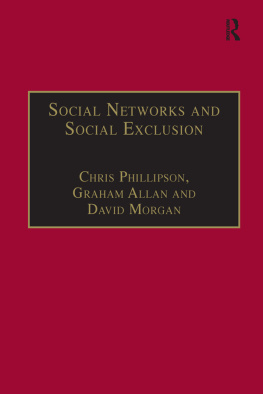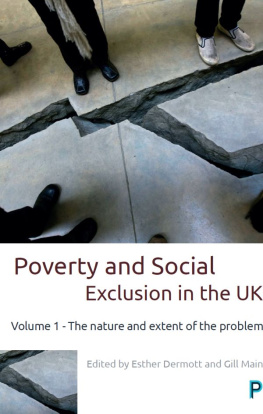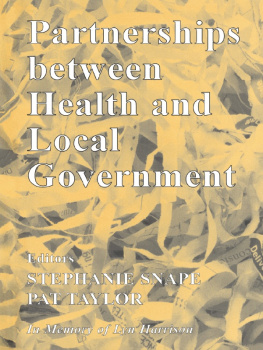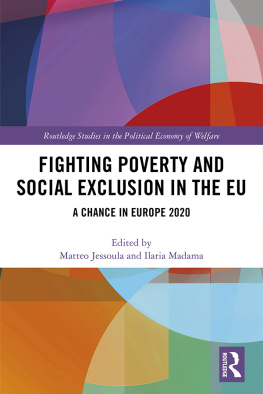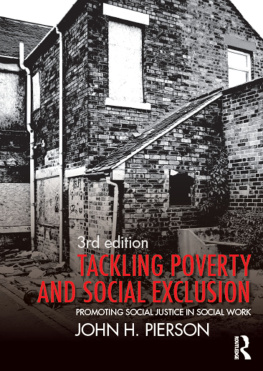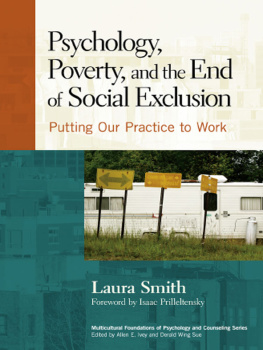
First published 2004 by Qual Institute Press
Published 2016 by Routledge
2 Park Square, Milton Park, Abingdon, Oxon OX14 4RN
711 Third Avenue, New York, NY 10017, USA
Routledge is an imprint of the Taylor & Francis Group, an informa business
Copyright 2004 Colleen Reid
All rights reserved. No part of this book may be reprinted or reproduced or utilised in any form or by any electronic, mechanical, or other means, now known or hereafter invented, including photocopying and recording, or in any information storage or retrieval system, without permission in writing from the publishers.
Notice:
Product or corporate names may be trademarks or registered trademarks, and are used only for identification and explanation without intent to infringe.
Canadian Cataloging-in-Publication Data
Reid, Colleen
The wounds of exclusion: poverty, womens health, and social
justice/Colleen Reid
Includes bibliographical references and indexes.
ISBN 1-55195-105-3
1. Poor women - Health and hygeine - British Columbia - Vancouver.
2. Social medicine - British Columbia - Vancouver. I. Title
RA564.85.R465 2004362.10869420971133C2004-902057-9
Graphic Design:Murray Pearson
Front Cover Artwork:Michelle Sotto
Back Cover Photo:Michelle Sotto
ISBN 13: 978-1-598-74290-9 (pbk)
T his research would not have been possible without the participation of the following WOAW women - Alexa, Arlene, Caroline, Cassie, Christine, Cynthia, Elizabeth, Gloria, Helen, Joanne, Julie, Katharine, Kelly, Maey, Martha, Rene, Susan, Theresa, Trina, Virginia Dawn, Wanda, and Willow. I learned and grew from our work together; they taught me what it means to be truly courageous, strong, and committed. Working with them leaves me hopeful that social change is possible. I would also like to thank the WOAW organization and the community service providers who warmly welcomed me - Louise Hara, Carla Alexander, Brenda Devine, Jim LaCroix, Gwen Wong, Andrea MacDonald, Diane Lego, Pam Bailey, and Bonnie Ste. Croix. I am inspired by their tenacity and dedication to their work. I would especially like to thank Louise Hara for helping me to better articulate my research interests and determine the need for the Research Team.
Dr. Allison Tom, my research supervisor, is a remarkable mentor and friend. With her uncanny ability to get to the core of difficult research issues and think deeply and analytically she enabled me to find the clarity and direction I needed. Allison shared my enthusiasm for my research while challenging me with humility and compassion. I thank Allison for enabling me to find my voice as a feminist researcher. Dr. Wendy Frisby, my Masters advisor and doctoral committee member, provided me with the opportunity to work with WOAW. We have shared the ups and downs of community-based research and I have learned from her insight and commitment to the ideals of feminist action research. I would also like to thank Dr. Carol
Herbert, who despite moving to London, Ontario remained an invaluable and active committee member, and Dr. Penny Gurstein, who supported and encouraged me all along the way. Throughout my Masters and Doctoral work, Dr. Jim Frankish, the Associate Director of the Institute for Health Promotion Research, has been an indispensible resource and support, and has faciliated my work in innumerable ways.
There were two groups of students who greatly enhanced my doctoral work at UBC - the WOAW Working Group and Ournet. The WOAW Working Group, including Pamela Ponic, Sydney Millar, Beth Pinnington, and Larena Hoeber, has been my sustenance for the last three years. Our discussions and support for one another transformed my Ph.D. from an often lonely and isolating experience to one of connectedness and sharing. I would particularly like to thank Pam for her insight and intellect. Together we have dissected challenging research issues, written papers and presentations, and openly shared our own biases and assumptions. Ournet provided a rich learning environment that stimulated me both intelllectually and emotionally. In particular, Id like to thank Marina Niks, Lynette Harper, and Johanna Kuyvenhoven for the conversations, passion, and friendships we have shared.
Finally, I thank my family. My parents, Heidi and Gordon, have always instilled in me a sense of confidence and possibility. They encouraged me to pursue my passions and to never compromise my interests for the sake of conventions. My sister Heather has expanded my world vision through helping me connect authentically with my work. My life partner, Rod Tukker, has been a pillar of support and encouragement every step of the way. He has facilitated this journey in innumerous ways. I feel such gratitude having you in my life - thank you.
I am grateful to the B.C. Health Research Foundation (now the Michael Smith Foundation for Health Research), the BC Centre of Excellence for Womens Health, and the Social Sciences and Humanities Research Council, for their financial and in-kind support over the last 5 years.
W hen I was eighteen, a friend of mine worked for Ottawa Parks and Recreation as a wading pool lifeguard. She told me that the job was fun and social and that as a lifeguard you worked outside all day and programmed activities for children in the local area. I was hired and stationed at a pool in one of the lowest income areas in Ottawa. Over that summer I witnessed unbelievable stories of deprivation and hopelessness - a four-year-old child at the pool for 10 hours a day with no food, teenagers selling merchandise they had stolen the day before, a six-year-old girl babysitting her two-year-old brother, a twelve-year-old girl telling me that she wanted to be a hooker when she grew up. Almost every day someone asked me for money and my lunch. I saw parents who were so impoverished that they could not provide a secure home for their children; most of them lived in violence and scarcity in what the local residents called the foster farm. What truly amazed me, however, was not the extent of the deprivation, but how, despite living only 10 minutes apart, we had drastically different trajectories of every day life. My security and sense of reality, that were nestled in my suburban middle-class upbringing, became unhinged; poverty and my own privilege were now visible to me.
Watching the news coverage of the Montreal Massacre in 1989 was another experience that profoundly shifted my worldview. As I watched the paramedics carry the womens bodies out of the engineering building, I saw parents and friends approach the scene, confused and panicked. I remember seeing a bewildered boyfriend learn that his girlfriend had been murdered. I was stunned that such an act of violence, injustice, and hate could occur, and realized that this event could just as easily have happened in one of my classes at Queens University. I could have been one of the women being carried out on the stretcher.
I now recognize how these experiences - my work at the wading pool and watching the Montreal Massacre - had a formative influence on what I am pursuing today. They led me to identify with the feminist movement and to uncover my passion for examining social injustices, reflecting on my own assumptions and privilege, and understanding womens roles and experiences. I now believe that through remaining compassionate and humble every person has a role to play in the pursuit of social justice. Fundamentally, this analysis is my attempt at taking part in the work of social justice.


